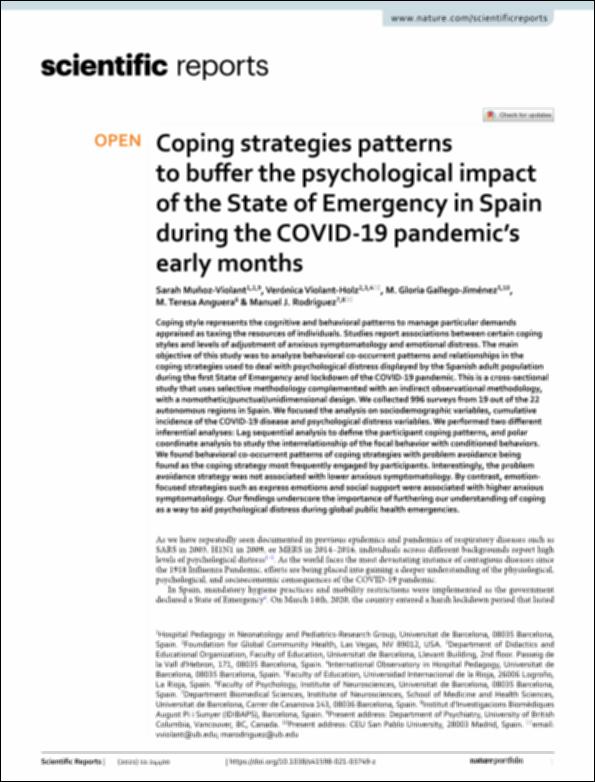Please use this identifier to cite or link to this item:
http://hdl.handle.net/10637/14882Coping strategies patterns to buffer the psychological impact of the State of Emergency in Spain during the COVID‑19 pandemic’s early months
| Title: | Coping strategies patterns to buffer the psychological impact of the State of Emergency in Spain during the COVID‑19 pandemic’s early months |
| Authors : | Muñoz Violant, Sarah Violant Holz, Verónica Gallego Jiménez, María Gloria Anguera, María Teresa Rodríguez, Manuel J. |
| Keywords: | España; COVID-19; Pandemia; Estado de emergencia |
| Publisher: | Nature Research |
| Citation: | Muñoz-Violant, S., Violant-Holz, V., Gallego-Jiménez, M.G. et al. Coping strategies patterns to buffer the psychological impact of the State of Emergency in Spain during the COVID-19 pandemic’s early months. Sci Rep 11, 24400 (2021). https://doi.org/10.1038/s41598-021-03749-z |
| Abstract: | Coping style represents the cognitive and behavioral patterns to manage particular demands appraised as taxing the resources of individuals. Studies report associations between certain coping styles and levels of adjustment of anxious symptomatology and emotional distress. The main objective of this study was to analyze behavioral co-occurrent patterns and relationships in the coping strategies used to deal with psychological distress displayed by the Spanish adult population during the first State of Emergency and lockdown of the COVID-19 pandemic. This is a cross-sectional study that uses selective methodology complemented with an indirect observational methodology, with a nomothetic/punctual/unidimensional design. We collected 996 surveys from 19 out of the 22 autonomous regions in Spain. We focused the analysis on sociodemographic variables, cumulative incidence of the COVID-19 disease and psychological distress variables. We performed two different inferential analyses: Lag sequential analysis to define the participant coping patterns, and polar coordinate analysis to study the interrelationship of the focal behavior with conditioned behaviors. We found behavioral co-occurrent patterns of coping strategies with problem avoidance being found as the coping strategy most frequently engaged by participants. Interestingly, the problem avoidance strategy was not associated with lower anxious symptomatology. By contrast, emotionfocused strategies such as express emotions and social support were associated with higher anxious symptomatology. Our findings underscore the importance of furthering our understanding of coping as a way to aid psychological distress during global public health emergencies. |
| URI: | http://hdl.handle.net/10637/14882 |
| Rights : | OpenAccess http://creativecommons.org/licenses/by/4.0/deed.es |
| ISSN: | 2045-2322 |
| Issue Date: | 22-Dec-2021 |
| Center : | Universidad San Pablo-CEU |
| Appears in Collections: | Facultad de Humanidades y CC de la Comunicación |
Items in DSpace are protected by copyright, with all rights reserved, unless otherwise indicated.


